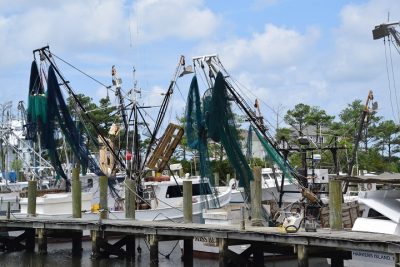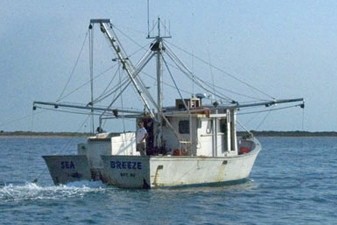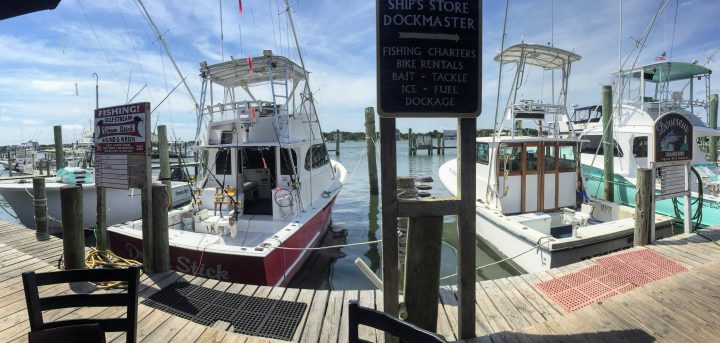
Published in partnership with NC Health News
COASTAL NORTH CAROLINA — North Carolina fishermen work long hours, and many fish alone. When harvesting shrimp, they can stay out on the water four to five days at a time.
Supporter Spotlight
Broken bones and lacerations are common. Fishermen are disproportionately affected by skin cancer. Most complain of back pain and others lose limbs, even as many don’t have health insurance.
Some die by drowning.
One hurricane or unexpected cold front can move their crop. The stakes are high.
But they don’t think much about these things and they didn’t see why a health care reporter was interested in talking to them, even as they admitted health care concerns have changed how many approached their fishing careers.
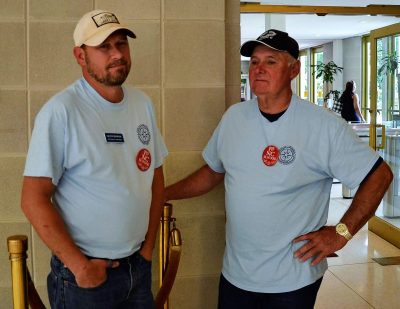
For Glenn Skinner, 45, fishing is freedom. It’s in his blood. He’s a fourth-generation fisherman from Carteret County who has been on fishing boats since he was 4 years old.
Supporter Spotlight
“That’s the way most people get into it,” he said. “I have farmers and fishermen on both sides of my family. I was going to do one or the other.
“I chose the water.”
He’s had to take other jobs and fished part time over the years to make ends meet. But he says he would rather be on the water. Now his teenage daughter is even talking about going into his line of work.
“My dad just kind of turned me loose. I couldn’t get into too much trouble. And I loved it,” he said. “That’s what draws me to it now. I can go out there. I’m my own boss and make my own rules and my own hours. Other than following state regulations, I’m pretty much free to make my own decisions and do what I want. Not many jobs can say that.”
Health of N.C. Fishermen
Researchers with the N.C. Agromedicine Institute at East Carolina University collect health data on North Carolina’s farmers, loggers and fishermen. The institute recently released a small pilot study with some initial data, but there have been few studies on the state’s fishermen. The study results have yet to be published online.
The institute was founded about 20 years ago by physicians at the North Carolina Cooperative Extension at N.C. State University, North Carolina A&T State University and East Carolina University.
The study included responses from 39 fishermen and four spouses living in 13 of North Carolina’s 20 coastal counties. The majority said their health status was “good,” but about a quarter reported either “fair” or “poor” health.
A little more than 20 percent reported having skin cancer; more than 30 percent reported hypertension.
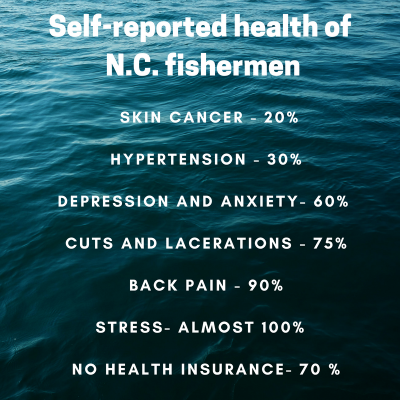
Skinner said he had never worn sunscreen in his life.
“Nobody told me growing up that it was necessary. Day in and day out, you burnt and you peeled. We are paying for that now,” he said noting that many fishermen his age are getting skin cancers removed.
About 60 percent of fishermen who responded for the study said they deal with depression and anxiety on a monthly basis. About 75 percent said they deal with cuts and lacerations every month. More than 80 percent reported having headaches monthly.
“People think farmers and loggers are difficult (to reach). Those two are a walk in the park compared to fishermen, because they are not available,” said Robin Tutor-Marcom, director of the institute. “When they are in port, they are unloading catch, and stocking up to go back out.”
Skinner, who is also the executive director of the North Carolina Fisheries Association, said he remembers folks from the Agromedicine Institute reaching out. He added that they likely had a hard time tracking down a lot of fishermen because they are “fiercely independent” and “don’t get involved with anything except for fishing.”
Injury Risk
When asked about injuries, another lifetime fisherman, Bradley Styron of Cedar Island pointed to the remaining half of his thumb and talked about another time a boat trailer crushed his foot.
But Styron said he’s one of the luckier ones.
He spoke of a time when he was on the water and a man got caught up in the gear and was cut in half. He saw another man lose a leg. And his son-in-law drowned while fishing.
“You kind of have an obligation to yourself to protect yourself as much as possible because that’s how you make a living,” he said. “You don’t have sick days or disability.”
“You kind of have an obligation to yourself to protect yourself as much as possible because that’s how you make a living.”
Bradley Styron, Commercial fisherman
More than 90 percent of survey respondents reported back pain on a monthly basis, while 30 percent said they have back pain daily. And almost all said they experience stress on a monthly basis.
Almost half of those who responded said they fish alone. About 70 percent reported having no health insurance. And 85 percent fish more than 40 hours a week. About 95 percent don’t wear a personal floatation device.
The Agromedicine study concluded that isolation, regulatory pressures, personal behaviors and lack of health insurance increase fishermen’s risk for adverse health outcomes. Tutor-Marcom said that while the study is small, she believes it “speaks volumes” and is working to expand it.
There are already a limited number of medical providers in the coastal communities, which are mostly rural. And many times, fishermen only come off their boats from Friday to Sunday when there are few medical services available, said Tutor-Marcom.
“How do we get health care into the fishing villages? There needs to be services available when the fishermen are in port,” she said. “Their emphasis is on meeting the catch limit. And there is a narrow window to meet that. So it means they are often fishing in bad weather, at night, or going for extended periods of time without sleep.”
Leaving the Industry
The number of licensed commercial fishermen has steadily declined in North Carolina.
In 2017, there were 4,968 licensed fishermen, according to the N.C Department of Environmental Quality. That’s down from 6,990 in 2000.
Skinner said the decline can be attributed to increased regulations, higher fuel prices and a lack of health insurance and other benefits.
“It got to the point where it wasn’t cost efficient to go out at one time,” Skinner said. “Fuel was about $4 a gallon. And the price of shrimp and fish didn’t go up at the same time.”
He said while regulations are their biggest concern right now, some people left the industry for stability and certainty.
“I think access to health care in our industry, and probably any industry made up of small business owners like ours, just having access to affordable health care is a problem,” he said. “If you have employees, you can’t afford to provide health care.”
And more and more commercial fishermen are finding jobs with benefits that allow them to fish part time.
“They can get a job in the prison system or ferry system, gain access to health care, and a lot of those jobs are two weeks on, two weeks off. So during their two weeks off, they go back to fish,” Skinner said.
“So health care, although it isn’t one of our top issues that we discuss, it probably has affected this industry in ways most of us don’t realize,” he said. “It’s forced a lot of full-time commercial fishermen into that part-time status or out of the industry.”
Isolation and Stress
Dealing with stress is part of the job for commercial fishermen.
“If we don’t work that day, we don’t get paid,” Skinner said. “If we do work that day and we don’t catch, we don’t get paid.”
When asked about feelings of stress, isolation or depression, Skinner’s response was that most “just deal with it.”
“Today was a bust, tomorrow it’s going to be better. You have to remain positive,” he said.
Styron echoed that. His parents fished, and he grew up fishing.
“When you live where we live, there aren’t a lot of opportunities. You have to deal with what nature gives you,” Styron said. “Where I live now is 30 miles from the first stoplight. That pretty much tells you that we don’t have a lot of infrastructure.
“This is just something we do. I’m not saying that there are not challenging times, there is,” he said. “But there are also challenging times selling cars.”
Skinner said he has seen a rise in alcohol and drug abuse in recent years. He also noted that opioid abuse is on the rise in most rural communities and may not be specific to commercial fishing.
“I think that’s how people deal with stress,” he said. “They take themselves out of the world for a minute. They get high, get drunk and for a little while, it’s not there anymore.”
This is how some cope with the job’s uncertainty.
“You get on that tipping point where you’ve invested everything and one weather event destroys all that and you’re threatened with losing everything you’ve got. Some people can’t handle that. That’s prevalent in our industry, the same as farming.”
This story is provided courtesy of N.C. Health News, a nonprofit news service covering health and environmental issues in North Carolina.



